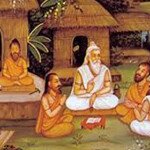This is the ancient land where wisdom made its home before it went into any other country, the same India whose influx of spirituality is represented, as it were, on the material plane, by rolling rivers like oceans, where the eternal Himalayas, rising tier above tier with their snowcaps, look as it were into the very mysteries of heaven. Here is the same India whose soil has been trodden by the feet of the greatest sages that ever lived. Here first sprang up inquiries into the nature of man and into the internal world. Here first arose the doctrines of the immortality of the soul, the existence of a supervising God, an immanent God in nature and in man, and here the highest ideals of religion and philosophy have attained their culminating points. This is the land from whence, like the tidal waves, spirituality and philosophy have again and again rushed out and deluged the world, and this is the land from whence once more such tides must proceed in order to bring life and vigour into the decaying races of mankind. It is the same India which has withstood the shocks of centuries, of hundreds of foreign invasions of hundreds of upheavals of manners and customs. It is the same land which stands firmer than any rock in the world, with its undying vigour, indestructible life. Its life is of the same nature as the soul, without beginning and without end, immortal; and we are the children of such a country.
Children of India, I am here to speak to you today about some practical things, and my object in reminding you about the glories of the past is simply this. Many times have I been told that looking into the past only degenerates and leads to nothing, and that we should look to the future. That is true. But out of the past is built the future. Look back, therefore, as far as you can, drink deep of the eternal fountains that are behind, and after that, look forward, march forward and make India brighter, greater, much higher than she ever was. Our ancestors were great. We must first recall that. We must learn the elements of our being, the blood that courses in our veins; we must have faith in that blood and what it did in the past; and out of that faith and consciousness of past greatness, we must build an India yet greater than what she has been. There have been periods of decay and degradation. I do not attach much importance to them; we all know that. Such periods have been necessary. A mighty tree produces a beautiful ripe fruit. That fruit falls on the ground, it decays and rots, and out of that decay springs the root and the future tree, perhaps mightier than the first one. This period of decay through which we have passed was all the more necessary. Out of this decay is coming the India of the future; it is sprouting, its first leaves are already out; and a mighty, gigantic tree, the Urdhvamula, is here, already beginning to appear…
The problems in India are more complicated, more momentous, than the problems in any other country. Race, religion, language, government — all these together make a nation The elements which compose the nations of the world are indeed very few, taking race after race, compared to this country. Here have been the Aryan, the Dravidian, the Tartar, the Turk, the Mogul, the European — all the nations of the world, as it were, pouring their blood into this land. Of languages the most wonderful conglomeration is here; of manners and customs there is more difference between two Indian races than between the European and the Eastern races.
The one common ground that we have is our sacred tradition, our religion. That is the only common ground, and upon that we shall have to build. In Europe, political ideas form the national unity. In Asia, religious ideals form the national unity. The unity in religion, therefore, is absolutely necessary as the first condition of the future of India. There must be the recognition of one religion throughout the length and breadth of this land. What do I mean by one religion? Not in the sense of one religion as held among the Christians, or the Mohammedans, of the Buddhists. We know that our religion has certain common grounds, common to all our sects, however varying their conclusions may be, however different their claims may be. So there are certain common grounds; and within their limitation this religion of ours admits of a marvellous variation, an infinite amount of liberty to think and live our own lives. We all know that, at least those of us who have thought; and what we want is to bring out these life-giving common principles of our religion, and let every man, woman, and child, throughout the length and breadth of this country, understand them, know them, and try to bring them out in their lives. This is the first step; and, therefore, it has to be taken.
We see how in Asia, and especially in India, race difficulties, linguistic difficulties, social difficulties, national difficulties, all melt away before this unifying power of religion. We know that to the Indian mind there is nothing higher than religious ideals, that this is the keynote of Indian life, and we can only work in the line of least resistance. It is not only true that the ideal of religion is the highest ideal; in the case of India it is the only possible means of work; work in any other line, without first strengthening this, would be disastrous. Therefore the first plank in the making of a future India, the first step that is to be hewn out of that rock of ages, is this unification of religion. All of us have to be taught that we Hindus — dualists, qualified monists, or monists, Shaivas, Vaishnavas, or Pâshupatas — to whatever denomination we may belong, have certain common ideas behind us, and that the time has come when for the well-being of ourselves, for the well-being of our race, we must give up all our little quarrels and differences.
Be sure, these quarrels are entirely wrong; they are condemned by our scriptures, forbidden by our forefathers; and those great men from whom we claim our descent, whose blood is in our veins, look down with contempt on their children quarrelling about minute differences.
With the giving up of quarrels all other improvements will come. When the life-blood is strong and pure, no disease germ can live in that body. Our life-blood is spirituality. If it flows clear, if it flows strong and pure and vigorous, everything is right; political, social, any other material defects, even the poverty of the land, will all be cured if that blood is pure. For if the disease germ be thrown out, nothing will be able to enter into the blood. To take a simile from modern medicine, we know that there must be two causes to produce a disease, some poison germ outside, and the state of the body. Until the body is in a state to admit the germs, until the body is degraded to a lower vitality so that the germs may enter and thrive and multiply, there is no power in any germ in the world to produce a disease in the body. In fact, millions of germs are continually passing through everyone’s body; but so long as it is vigorous, it never is conscious of them. It is only when the body is weak that these germs take possession of it and produce disease. Just so with the national life. It is when the national body is weak that all sorts of disease germs, in the political state of the race or in its social state, in its educational or intellectual state, crowd into the system and produce disease. To remedy it, therefore, we must go to the root of this disease and cleanse the blood of all impurities. The one tendency will be to strengthen the man, to make the blood pure, the body vigorous, so that it will be able to resist and throw off all external poisons.
We have seen that our vigour, our strength, nay, our national life is in our religion. I am not going to discuss now whether it is right or not, whether it is correct or not, whether it is beneficial or not in the long run, to have this vitality in religion, but for good or evil it is there; you cannot get out of it, you have it now and for ever, and you have to stand by it, even if you have not the same faith that I have in our religion. You are bound by it, and if you give it up, you are smashed to pieces. That is the life of our race and that must be strengthened. You have withstood the shocks of centuries simply because you took great care of it, you sacrificed everything else for it. Your forefathers underwent everything boldly, even death itself, but preserved their religion. Temple alter temple was broken down by the foreign conqueror, but no sooner had the wave passed than the spire of the temple rose up again. Some of these old temples of Southern India and those like Somnâth of Gujarat will teach you volumes of wisdom, will give you a keener insight into the history of the race than any amount of books. Mark how these temples bear the marks of a hundred attacks and a hundred regenerations, continually destroyed and continually springing up out of the ruins, rejuvenated and strong as ever! That is the national mind, that is the national life-current. Follow it and it leads to glory. Give it up and you die; death will be the only result, annihilation the only effect, the moment you step beyond that life-current.
I do not mean to say that other things are not necessary. I do not mean to say that political or social improvements are not necessary, but what I mean is this, and I want you to bear it in mind, that they are secondary here and that religion is primary. The Indian mind is first religious, then anything else. So this is to be strengthened, and how to do it? I will lay before you my ideas. They have been in my mind for a long time, even years before I left the shores of Madras for America, and that I went to America and England was simply for propagating those ideas. I did not care at all for the Parliament of Religions or anything else; it was simply an opportunity; for it was really those ideas of mine that took me all over the world.
My idea is first of all to bring out the gems of spirituality that are stored up in our books and in the possession of a few only, hidden, as it were, in monasteries and in forests — to bring them out; to bring the knowledge out of them, not only from the hands where it is hidden, but from the still more inaccessible chest, the language in which it is preserved, the incrustation of centuries of Sanskrit words. In one word, I want to make them popular. I want to bring out these ideas and let them be the common property of all, of every man in India, whether he knows the Sanskrit language or not. The great difficulty in the way is the Sanskrit language — the glorious language of ours; and this difficulty cannot be removed until — if it is possible — the whole of our nation are good Sanskrit scholars. You will understand the difficulty when I tell you that I have been studying this language all my life, and yet every new book is new to me. How much more difficult would it then be for people who never had time to study the language thoroughly! Therefore the ideas must be taught in the language of the people; at the same time, Sanskrit education must go on along with it, because the very sound of Sanskrit words gives a prestige and a power and a strength to the race. The attempts of the great Ramanuja and of Chaitanya and of Kabir to raise the lower classes of India show that marvellous results were attained during the lifetime of those great prophets; yet the later failures have to be explained, and cause shown why the effect of their teachings stopped almost within a century of the passing away of these great Masters.
The secret is here. They raised the lower classes; they had all the wish that these should come up, but they did not apply their energies to the spreading of the Sanskrit language among the masses. Even the great Buddha made one false step when he stopped the Sanskrit language from being studied by the masses. He wanted rapid and immediate results, and translated and preached in the language of the day, Pâli. That was grand; he spoke in the language of the people, and the people understood him. That was great; it spread the ideas quickly and made them reach far and wide. But along with that, Sanskrit ought to have spread. Knowledge came, but the prestige was not there, culture was not there. It is culture that withstands shocks, not a simple mass of knowledge. You can put a mass of knowledge into the world, but that will not do it much good. There must come culture into the blood. We all know in modern times of nations which have masses of knowledge, but what of them? They are like tigers, they are like savages, because culture is not there. Knowledge is only skin-deep, as civilisation is, and a little scratch brings out the old savage. Such things happen; this is the danger. Teach the masses in the vernaculars, give them ideas; they will get information, but something more is necessary; give them culture. Until you give them that, there can be no permanence in the raised condition of the masses. There will be another caste created, having the advantage of the Sanskrit language, which will quickly get above the rest and rule them all the same. The only safety, I tell you men who belong to the lower castes, the only way to raise your condition is to study Sanskrit, and this fighting and writing and frothing against the higher castes is in vain, it does no good, and it creates fight and quarrel, and this race, unfortunately already divided, is going to be divided more and more. The only way to bring about the levelling of caste is to appropriate the culture, the education which is the strength of the higher castes. That done, you have what you want.
Source: Complete-Works, Volume 3, Lectures from Colombo to Almora











